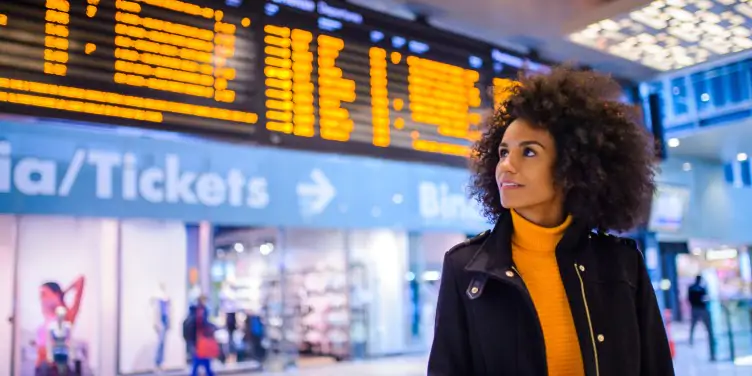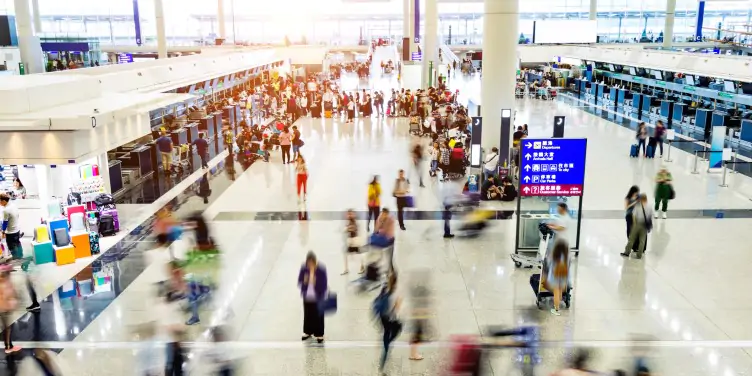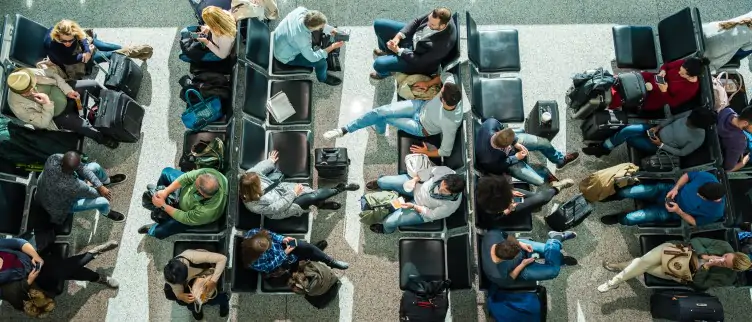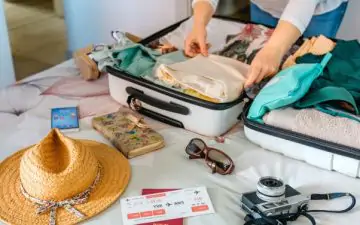Expert advice on avoiding travel delays

It’s a frustrating situation no traveller wants to find themselves in: being stuck at the airport after a cancelled flight, or waiting for a plane to depart that is hours behind schedule.
But with more of us heading to the airport as we approach the peak travel season, how can you avoid travel delays? And what happens when a cancelled flight throws your plans into chaos?
How to avoid travel delays
1. Book flights at quieter times
The first step to avoiding travel delays is to be clever with the dates, and times of day you fly.
Passengers who prefer early morning or late-night flights are likely to experience smoother journeys to the airport, thanks to the naturally quieter roads. And when it comes to the ideal days for flying, Airadvisor says that Tuesdays and Wednesdays are usually quieter for travel.
If you’re booking a getaway during the school summer holidays, the last week of August and the first week of September are typically less busy – and cheaper – than earlier in the season.
According to ABTA, this is due to many parents wanting to travel as soon as possible following the start of the break.
Timing your trips during off-peak periods can reduce the chances of flight delays.
2. Track your flight
Before arriving at the airport, download your airline’s app to keep an eye on your flight in real-time. It’s a handy way to keep an eye on the status of your flight and means you’ll be notified of any travel delays or cancellations.
Airline apps can also help you to find your way around an unfamiliar airport or share gate information for any of your connecting flights.
3. Keep an eye on the weather conditions
Before your flight, check the weather conditions ahead of travelling to the airport, as well as your holiday destination. Bad weather like storms may delay your flight, or even cause it to be cancelled.
If you know there is incoming severe weather ahead of your flight, remember to check-in with your airline’s app in the run up to your flight. Some airlines will let you change your flight in advance if there is a strong chance of disruption.
4. Plan your journey
The key to a smooth airport journey is planning ahead to dodge any travel hiccups that might make you miss your flight. Be sure to check for roadworks, closures, and traffic updates before you head out. And if you’re relying on public transport, watch out for any rail or underground strikes on your travel day, as you might need a backup plan.
What to do if your flight is delayed or cancelled
1. Contact travel company / airline
If your flight has been cancelled, you’ll need to contact your travel operator, travel provider or airline. They should be able to help you to rearrange your trip for a later time or date.
In the case of a ‘significantly delayed’ flight, then under UK law, your flight provider will need to offer you the following:
- Food and drink – often given in vouchers.
- Accommodation if your flight is delayed overnight.
- Transport to and from your accommodation, or home if you live nearby!
The definition of a ‘significant delay’ varies based on the type of flight you’re waiting for: short-haul (2+ hour wait), medium-haul (3+ hour wait), or long-haul (4+ hour wait) flights.
If your airline doesn’t cover this, then you may be able to claim on your travel insurance policy.
2. Contact your credit card company
If you’ve reached out to your travel provider and they can’t help to reschedule or provide a refund, then your bank or credit card company may be able to help.
You may be able to recoup the costs through a ‘chargeback claim’, where your card issuer can refund funds due to a disputed charge.
3. Claim on your travel insurance
If your flight is cancelled or significantly delayed, and neither your travel provider nor credit card company can refund your costs, you may be able to claim on your travel insurance. If your flight is cancelled or delayed more than 12 hours due to strikes, industrial action, adverse weather conditions, air traffic control failures, or mechanical aircraft failures, travel insurance can cover you.
Don’t wait until the last minute to buy travel insurance. Get it when you book your trip to make sure you’re covered for cancellations!
Having travel insurance can give you peace of mind, so you can focus on enjoying your holiday.













